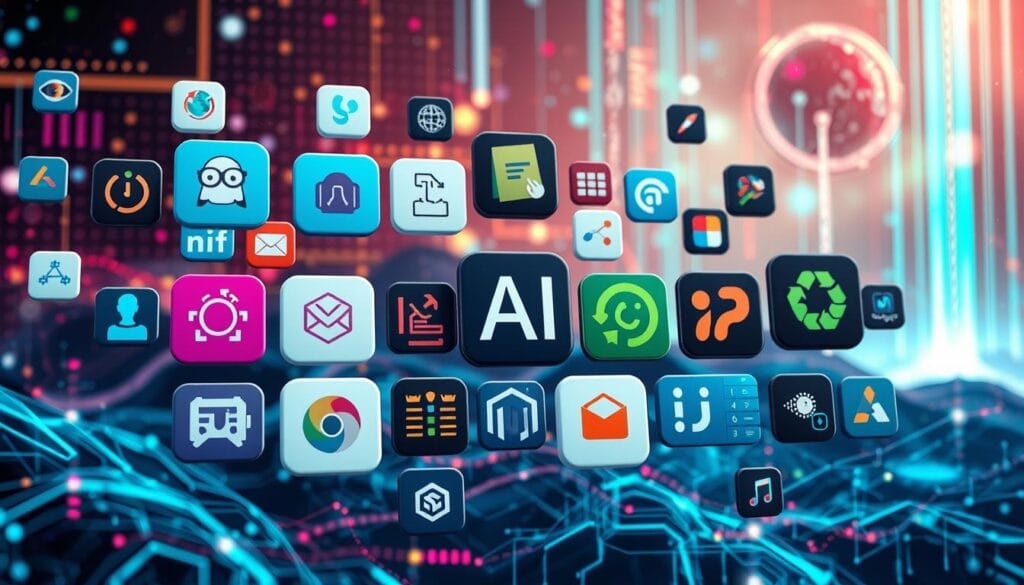In today’s fast world, technology changes quickly, leaving many feeling lost. Artificial intelligence is at the center of this, bringing both excitement and worry about its role in our lives. People are curious about the top AI app, looking for one that boosts productivity and offers a personal touch.
This search leads to a big question: which AI app is the best? As the AI software market is set to grow to around $126 billion by 2025, finding the right app is key1. This journey is not just about technology; it’s about finding ways to make our lives more efficient and innovative.
Key Takeaways
- The global AI software market is projected to grow significantly, reaching approximately $126 billion by 20251.
- Identifying the top AI app is essential for enhancing user experiences in a tech-driven landscape.
- AI applications are integral in personal and professional productivity across various sectors.
- Understanding individual needs is critical when selecting the best AI applications.
- Market trends reveal a strong demand for innovative and personalized AI solutions.
Introduction to AI Apps
Artificial intelligence is changing the world of technology, especially in mobile apps. Knowing how AI works helps us see how it makes our apps better.
Understanding Artificial Intelligence
AI uses algorithms and machine learning to do things humans do, like understand language and make decisions. It can look at lots of data to find new solutions and make smart choices.
The Role of AI in Mobile Applications
AI apps are leading this change. They offer features like speech recognition, personalized content, and automated tasks. These features make our interactions with apps more efficient and enjoyable.
By using AI, apps can learn what we like and make our experiences better. This makes our daily tasks easier and more personalized.
AI is important in many areas. For example, it’s used in healthcare, education, e-commerce, and transportation2. In healthcare, AI helps with early diagnosis and custom treatment plans2. In education, AI automates tasks and creates learning plans just for you2.
In e-commerce, AI improves product suggestions and manages inventory better2. The AI market is growing fast, expected to hit £1609 billion by 20303.
AI Applications in Today’s Marketplace
The AI world is changing fast, with a huge growth in AI software. This growth comes from people wanting apps that fit their needs. This shift changes how apps are made and what they do.
Growth of AI Software Market
The AI app market is now worth billions of dollars. It’s growing fast because people want apps that are easy to use and offer quick services. Apps like ChatGPT, Gemini, Copilot, and Claude offer many features, from chatbots to image editing4. ChatGPT, made by OpenAI, is known for its great text creation and user interaction4.
User Demand for Personalized Experiences
About 33% of smartphone users use AI apps often5. Tools like Duolingo and ELSA Speak make learning languages fun and personal. This demand for custom experiences pushes companies to use AI in their work5. Also, 4 out of 5 startups see AI as key to improving their operations5.
Features of Leading AI Apps
Top AI apps offer many cool features to meet different user needs. They use natural language processing, machine learning, and data analytics to improve how we use them. ChatGPT is a great example, showing how well it can answer questions and help users6.
There are over 60 AI tools out there, including chatbots like ChatGPT, Claude, and Meta AI6. These tools can check grammar, edit videos, and transcribe audio. They’re really good at meeting user needs6.
Common Capabilities Across AI Apps
AI apps share some key features that make them useful. Machine learning lets them get better over time by learning from us. Natural language processing makes talking to them easy and natural.
As AI apps get better, they promise to make our experiences even better. They aim to meet the high standards of today’s tech users.
User Experience and Intuitive Design
The best AI apps focus on design and user experience. They make sure it’s easy to use and fun. This keeps users happy and coming back for more.
Apps like Grammarly and Lensa AI make tasks easy and fast. They offer quick results and great interfaces, making them popular7. By focusing on design, AI apps can build stronger connections with their users.
Top Performing AI Apps

Exploring the world of AI apps shows us many types available. We see chatbots, virtual assistants, and software for education, marketing, and photo editing. As users want more, AI apps keep growing, meeting each person’s needs.
Overview of Different Types of AI Applications
AI apps do many things to make our lives better. Chatbots like ChatGPT and Microsoft Copilot help with talking and work. Virtual assistants, like Siri and Google Assistant, make daily tasks easier. For specific needs, Jasper AI helps marketers, and Lensa is great for photo editing.
Comparative Analysis of Top AI Apps
ChatGPT became a top chat tech in November 2022 and grew even more in May 20248. Jasper AI for marketing starts at $49 a month, with plans for businesses9. Lensa shows how AI apps can specialize in photo editing. Microsoft Copilot, free, boosts productivity with GPT-4 Turbo8. These apps show how AI meets our needs in different ways.
Which is No 1 AI app?
ChatGPT is a top pick for those looking for advanced chatbot features. OpenAI created it, using cutting-edge language models for better conversations. It can answer questions, give helpful info, and even write different types of content.
ChatGPT as the Leading Chatbot
ChatGPT quickly understands and solves user problems, making it stand out. It gets better with time, thanks to learning from users. As AI becomes more popular, so does the need for advanced tools like ChatGPT.
Comparison with Other Top AI Apps
ChatGPT is a leader, but Microsoft Copilot and Google’s Assistant are close contenders. Each app offers something special for different needs. For example, ChatGPT Plus costs $20 a month for extra features10.
Adobe Premiere Pro’s AI tools for video editing start at $22.99 a month10. This competition drives AI apps to keep getting better and more user-friendly.
The Impact of AI Apps on Daily Life

AI apps are changing our daily lives in many ways. They help make work more efficient and help us manage our money better. Businesses use AI to improve how they work. This lets workers focus on important tasks instead of simple ones.
AI apps are everywhere, with 27% of Americans using them daily. This shows how common they have become11.
Enhancing Work Productivity
AI makes work better by improving how teams talk and work together. For example, AI in project management tools can guess how long projects will take. This helps teams work more efficiently.
Chatbots are now common in customer service. They show how AI helps in work. Using AI can save a lot of time and money, making work better.
AI in Personal Finance and Productivity
AI apps help with money management, like budgeting and tracking spending. This saves time and helps make better financial choices. Over 300 languages are supported in these apps, making financial communication easier for everyone12.
More and more people see the value in these apps. In fact, 44% of Americans use AI apps several times a week11.
Future Trends in AI Apps
The world of AI apps is changing fast. New technologies and what users want are driving these changes. Soon, AI apps will change how we interact with machines.
Innovations on the Horizon
Companies want to use smarter tech in their apps. They’re adding machine learning, natural language processing, and better user experiences. This will make apps more useful in fields like education, healthcare, and shopping.
The global AI market hit USD 150.2 billion in 2023. It’s growing fast, with a 36.8% CAGR from 2023 to 2030. By 2030, it’s expected to reach $1,345.2 billion, showing big growth chances in AI13.
Anticipated Market Growth and Demand
More people want tech that understands them. AI apps are becoming key in our lives, from photos to lifestyle. The e-commerce sector is growing thanks to AI, leading to more sales and happy customers14.
As users seek tailored experiences, AI will keep improving. This will lead to better tech and more innovation.
New AI tools are coming, like generative AI projects and better content creation. Custom AI for finance and healthcare is also getting attention. Open-source AI is helping small businesses join the AI world15.
User Experience: Choosing the Right AI App
When picking AI apps, knowing what you need is key. Many apps offer different things. You should figure out if you need something for personal, school, or work use. This helps you find the right app for your needs.
Evaluating Personal Needs and Preferences
Think about what you want from an app. If you want to work better, look for apps that help with that. By 2023, more than half of companies will use AI16. This shows how important it is to match what you want with what AI apps offer.
Assessing Features vs. Functionalities
It’s important to compare what an app offers with what you need. Knowing about features like AI insights or design can help you choose. For example, Uizard and ChatGPT are top picks for design tasks, with great reviews17. Make sure the app you pick meets your needs and is fun to use.
Conclusion
The world of AI applications is changing fast. It’s making a big difference in many areas, like education and healthcare. Knowing about AI tools helps us pick the best one for our needs.
AI+ is special because it does many things at once. It helps with work and learning, meeting both school and personal needs. These apps keep getting better, focusing on how easy they are to use and what they can do. This makes our work and learning better1819.
Choosing the right AI app is all about what you need and what it can do. This summary shows how AI is making things better for everyone. It helps us reach our goals in a fast-changing world.
FAQ
What is Artificial Intelligence?
How is AI revolutionizing mobile applications?
What is the projected growth of the AI software market?
Why is there a demand for personalized experiences in AI applications?
What are common capabilities across leading AI applications?
How important is user experience in AI applications?
What types of AI applications are currently popular?
What makes ChatGPT a leading chatbot?
How does ChatGPT compare to other top AI apps?
In what ways do AI applications enhance work productivity?
How do financial AI applications assist users?
What innovations are anticipated in the future of AI applications?
What is the anticipated market trend for AI applications?
How should users evaluate which AI apps to choose?
Why is it important to assess features versus functionalities in AI apps?
Source Links
- What are the Best AI Apps in 2024?
- Top 18 Artificial Intelligence (AI) Applications in 2024 | Passionate Design Agency
- Top 10 Most Popular Artificial Intelligence Apps
- 32 Top Artificial Intelligence (AI) Apps | Built In
- Top 15 Artificial Intelligence Applications in 2024
- The best AI productivity tools in 2025 | Zapier
- 8 Best AI Apps (2024) You Need to Try
- The best AI chatbots of 2024: ChatGPT, Copilot, and worthy alternatives
- The Best AI Chatbots for 2024
- 168 Best AI Tools Of 2024 (Fresh Update!)
- Public Awareness of Artificial Intelligence in Everyday Activities
- 20 Uses of Artificial Intelligence in Day-to-Day Life
- Top 5 AI App Trends in 2024
- 24 Cutting-Edge Artificial Intelligence Applications | AI Applications in 2024
- 10 top AI and machine learning trends for 2024 | TechTarget
- Choose the Right AI Model to Power Your App to the Next Level
- 9 Best AI tools for UX Designers | Looppanel
- Chat AI + Essay Writer
- The Best AI Tools for Students | IU International







